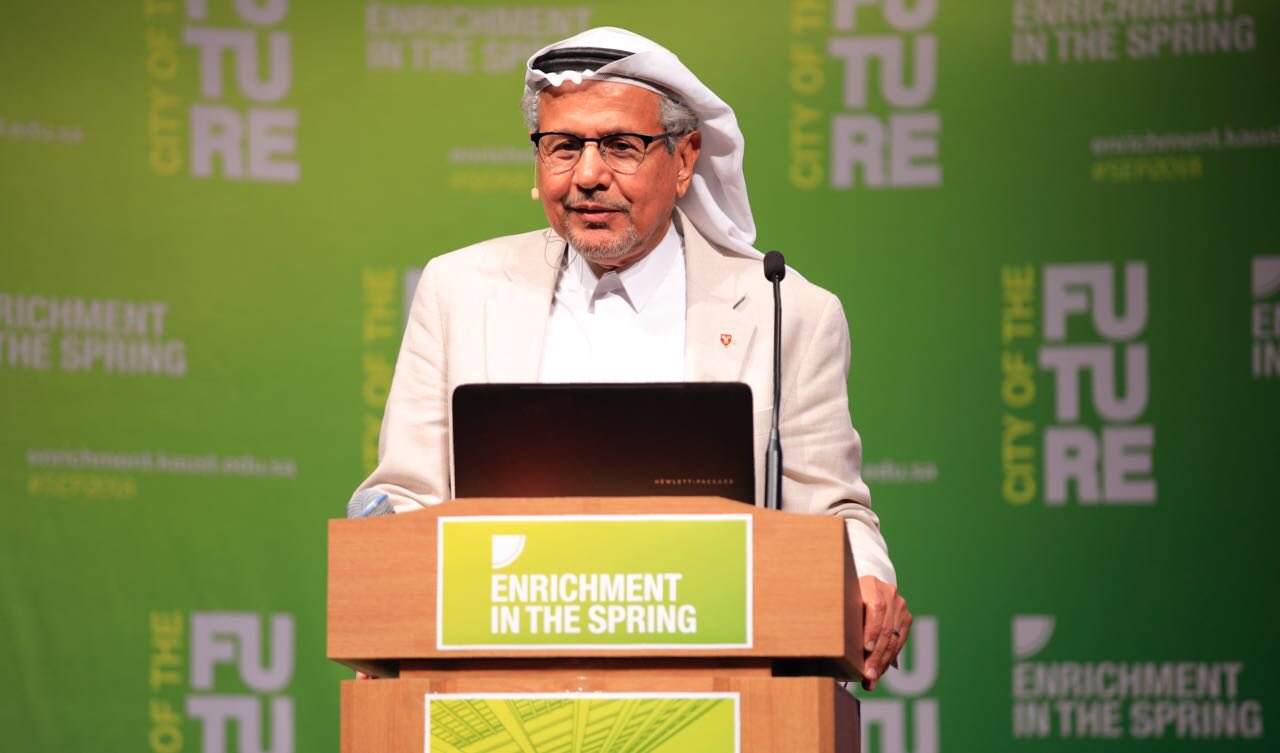Building global cities

Dr. Tarek Ali Fadaak, a member of the Committee on Housing, Water and Public Services and a Shura Council member, speaks on building innovative new Saudi cities during 2018 Enrichment in the Spring. File photo.
-By Abdullah Alhamdan, KAUST News
Global and local trends are leaning heavily toward environmental balance in urban planning, and there is a shift in focus from environments being perceived as merely places for work and accommodation. The world today is witnessing changes in planning and sustainability concepts, and this calls for improved economic resources and better preservation and management of natural and cultural resources to improve the quality of life.
"The Kingdom seeks to create Saudi cities with an infrastructure that will require further development by new generations of engineers with innovative ideas that contribute to better development solutions. Today, open spaces are either not enough or not well utilized aesthetically. Still, we are optimistic. Many new projects have made the best use of these spaces, as is the case here with KAUST," commented Dr. Tarek Ali Fadaak, a member of the Committee on Housing, Water and Public Services and a Shura Council member, during his 2018 KAUST Enrichment in the Spring Lecture. Developing urban spaces
Because urban planning requires thorough study to ensure comprehensiveness and consistency, Fadaak also addressed the future of public space urban development in Saudi Arabia. There are major challenges facing the Kingdom in this field. Most cities in Saudi Arabia and in the Middle East in general have unfortunately not paid enough attention to aesthetics. However, some urbanized cities like Jeddah have attempted to add creative structures and art to their public spaces.
Fadaak considers public spaces essential for Saudi Arabia's population, where demographics lean towards larger numbers of children and youth. Over the past 30 years, availability of public spaces has shrunk dramatically due to rising land prices. This has contributed to greater population density in adjacent areas, which, as a result, lack sufficient green spaces. Unfortunately, the majority of parks and public spaces are neglected and in too bad a condition to serve the Kingdom's urban population.
"This is the major challenge that will face future designers and engineers," Fadaak added.

King Abdullah Economic City or KAEC under development on the Red Sea coast. File photo.
Fadaak explained that Saudi Arabia's true treasure and power lies in its people. As such, the education sector needs to invest in youth and in delivering opportunities for them. This is particularly important, as Saudi boasts many distinguished minds currently obtaining their scientific education around the world, with a focus on medicine and scientific research. Upon their return home, these resources will be the strong driving force behind the Kingdom's future development.
Fadaak pointed out that the desert and vacant spaces of land also form part of urban development policies. The aim is to create new cities comparable to the best cities worldwide.
Building cities in the desert
"The biggest challenge facing the Kingdom in its quest to build cities in the heart of the desert is the lack of water, but this is not a permanent obstacle. There are solutions to every problem. An example is some historical cities such as Makkah and Madinah, which lacked sufficient water, but which have gone on to absorb large populations and which have become great cultural bases," Fadaak noted.
Regarding the best agricultural use of Saudi Arabia's vacant lands, Fadaq explained that this is not an impossible undertaking. An individual's water consumption is about 100 liters per day, and in some cities, water consumption reaches 250 liters per day. This represents wastage that can be utilized through recycling for irrigation, for example. He praised the studies and scientific research carried out by KAUST, all of which can be used in the future in this area.
Supporting the vision for the future
Speaking on the impact of global warming on future urban planning, Fadaak said that the Kingdom's major challenge is carbon emissions and the Kingdom's reliance on power—typically generated by burning fuel oil for desalination and generating electricity. This requires Saudi Arabia to find appropriate solutions in line with relevant programs and studies and Saudi Vision 2030.
Fadaak received his education in different cities in Oregon, U.S.—he obtained his Ph.D. in urban studies from Portland State University; his master's degree in management science from Willamette University; and his bachelor's degree from Lewis and Clark College. Fadaq has held several prestigious positions, the most recent including his membership of the Shura Council since 2009.
Related stories:
-
Saving ghost cities
-
Developing disposable lifesaving sensors
-
Understanding networked systems
- The dawn of a grassroots renaissance
-
The world of the future

